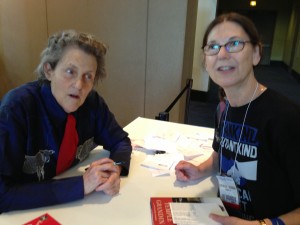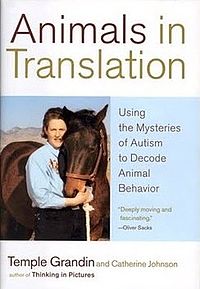I regularly participate in discussions related to children’s and YA literature on the child_lit list, and the week after the American Library Conference in Chicago, our discussion turned to the high points of the conference for those of us who attended. This way, those who could not be there got a report of the goings-on, with perspectives unique to each person who commented. Nancy Bo Flood asked me to repost and expand on my comment and loaned me one of her weeks to do so. Thanks, Nancy!
 For me, a high point was seeing Temple Grandin speak. She was one of the Auditorium Speakers, and I was surprised at how crowded the presentation was, given that it began on Sunday morning at 8:30 am. I was diagnosed in adulthood with Asperger’s syndrome (now under the umbrella of Autism Spectrum Disorders), which explained the difficulties I had growing up and even later in school and work. So much of what Dr. Grandin described of her childhood happened to me as well—for instance, my mother sent me to a “doctor” who played games with me and taught me how to take turns—and she lamented the waste of talent and potential when people on the spectrum wind up on disability playing video games (something I’m really trying to avoid) instead of working and contributing their unique perspectives to the world. A nice person standing behind me in the book signing line took my picture with her, and for me it felt like I was in the presence of a leader in my tribe. After I got my book signed, I saw two young people standing around talking and went up to them. We’re generally quite good at recognizing other people like us, and in this case, I met two delightful recent library school grads who had heard about my new novel, Rogue, based on some of my own experiences in middle and high school. Another recent grad joined us; he too is on the spectrum. After trying to interact with everyone else in a noisy, crowded, overstimulating, and often frustrating situation that is ALA, it was so wonderful to be in the presence of other people like me, or as the person behind me in the line said, “the people of your tribe.” (It was also thrilling to discover that one of the three shares with me a special interest in Lego constructions.)
For me, a high point was seeing Temple Grandin speak. She was one of the Auditorium Speakers, and I was surprised at how crowded the presentation was, given that it began on Sunday morning at 8:30 am. I was diagnosed in adulthood with Asperger’s syndrome (now under the umbrella of Autism Spectrum Disorders), which explained the difficulties I had growing up and even later in school and work. So much of what Dr. Grandin described of her childhood happened to me as well—for instance, my mother sent me to a “doctor” who played games with me and taught me how to take turns—and she lamented the waste of talent and potential when people on the spectrum wind up on disability playing video games (something I’m really trying to avoid) instead of working and contributing their unique perspectives to the world. A nice person standing behind me in the book signing line took my picture with her, and for me it felt like I was in the presence of a leader in my tribe. After I got my book signed, I saw two young people standing around talking and went up to them. We’re generally quite good at recognizing other people like us, and in this case, I met two delightful recent library school grads who had heard about my new novel, Rogue, based on some of my own experiences in middle and high school. Another recent grad joined us; he too is on the spectrum. After trying to interact with everyone else in a noisy, crowded, overstimulating, and often frustrating situation that is ALA, it was so wonderful to be in the presence of other people like me, or as the person behind me in the line said, “the people of your tribe.” (It was also thrilling to discover that one of the three shares with me a special interest in Lego constructions.)
 I’ve been familiar with Dr. Grandin’s work for a long time and admired her because she has distinguished herself professionally and made a major contribution to society through her work with farm animals. In fact, in an early chapter of Rogue, Kiara receives the gift of one of Temple Grandin’s books, Animals in Translation, from a family friend who seems to be the only person aware of how—and why—Kiara is different from the other kids her age. Kiara reads the book reluctantly—she isn’t much of a reader except for X-Men comics and the Internet—and Dr. Grandin’s first chapter describes how she was sent to a school for children with emotional problems. However, Kiara realizes that “…if Temple Grandin wrote a book, she must have turned out all right”—a reassuring thought for a young teenager who has just been suspended from school for attacking a girl who had humiliated her in public.
I’ve been familiar with Dr. Grandin’s work for a long time and admired her because she has distinguished herself professionally and made a major contribution to society through her work with farm animals. In fact, in an early chapter of Rogue, Kiara receives the gift of one of Temple Grandin’s books, Animals in Translation, from a family friend who seems to be the only person aware of how—and why—Kiara is different from the other kids her age. Kiara reads the book reluctantly—she isn’t much of a reader except for X-Men comics and the Internet—and Dr. Grandin’s first chapter describes how she was sent to a school for children with emotional problems. However, Kiara realizes that “…if Temple Grandin wrote a book, she must have turned out all right”—a reassuring thought for a young teenager who has just been suspended from school for attacking a girl who had humiliated her in public.
Dr. Grandin’s speech combined insight into the thought processes of persons on the autism spectrum with a call for understanding and inclusion—as well as a not-so-gentle nudge for those of us on the spectrum to step away from the video games, rejoin society, and speak up for ourselves. One of my favorite lines was, “When you’re a weird geek, you’ve got to learn to sell your work.”
The day before Dr. Grandin’s presentation, I attended the ALA Diversity Fair, which highlighted library programs for users with special needs. I met a number of wonderful, creative, committed people there as well and look forward to following up via some workshops with teens who are on the autism spectrum. I thank the American Library Association because this Diversity Fair and the Sunday morning speech would not have happened without ALA’s—and the library profession’s—absolute commitment to diversity.
2 comments for “On Meeting Temple Grandin”